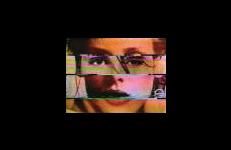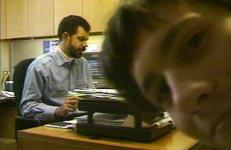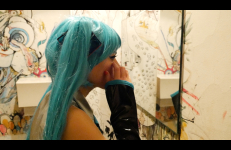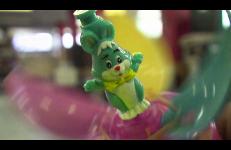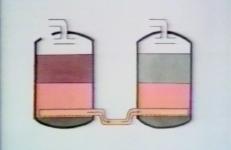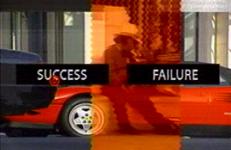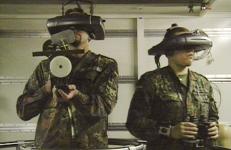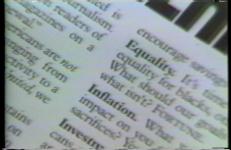Strike Anywhere is a video essay that takes as its point of departure Swedish "Match King" Ivar Kreuger, whose privatization of financial crisis management strategies bears a direct relation to late-20th Century policies implemented by the IMF and WTO. Between 1917 and 1932, Kreuger capitalized on shifts in global financial markets to control over 200 companies and establish matchstick monopolies in at least 34 countries. At the height of his success, Ivar Kreuger was worth approximately 30 million Swedish kronor (the equivalent of 100 billion USD today).
Consumer culture
Strike Anywhere is a video essay that takes as its point of departure Swedish "Match King" Ivar Kreuger, whose privatization of financial crisis management strategies bears a direct relation to late-20th Century policies implemented by the IMF and WTO. Between 1917 and 1932, Kreuger capitalized on shifts in global financial markets to control over 200 companies and establish matchstick monopolies in at least 34 countries. At the height of his success, Ivar Kreuger was worth approximately 30 million Swedish kronor (the equivalent of 100 billion USD today).
Constructed from a destroyed rescan of fashion magazine ads and a video self-portrait, Suspension is a meditation on the implicitly narcissistic nature of desire within a commodified context.
“Christopher Wilcha’s fascinating feature-length video reminds us how seldom we’re allowed to see certain businesses operating from the inside. Wilcha, a 22-year-old college graduate and alternative-rock enthusiast, was hired by the Columbia Record and Tape Club—apparently as a fluke—to help launch a whole new niche-marketing division, which brought him face-to-face with the contradictory meanings of the term ‘alternative’ once it’s been embraced by the mass market.
Hatsune Miku is a co-creation platform, personified by a cute and oddly seductive animated character. Fans bring her to life by creating content that she “delivers”. Her entire persona: lyrics, music and animation – is fan created, and that's her charm. Cosplaying Hatsune Miku, Ann Oren goes to Tokyo for a performative journey among these fans and explores the Miku phenomenon as an expression of collective fantasy. The habits of Miku's fans is a familiar exaggeration of our social media habits, that flood us with crowd creativity.
The evolution of man from ape to yuppie flashes before the viewer amid 3-D animation, paint box images, and digital compositions while a narrator provides satiric play-by-play commentary. Conceptually, verbally and graphically, man leaps forward through the centuries to master the litany of pop clichés and consumer culture acronyms of the modern age; and yet, he's never quite free of his original grunts.
“Take back the airwaves: Mexico’s video art doyenne Ximena Cuevas books herself onto the tabloid talk show Tombola (Raffle), toying at first with whimsical deconstruction until she turns the whole affair on its head by seizing the televisual flow itself.”
Too Many Things visits the world of objects — their accumulation and dispersal — and their creation of cummunities of curiosity. The title is somewhat ironic. My work has always fed on things as the symbolic and incidental expressions of human presence. For a photographer, or a filmmaker, there can never be too many things; the camera likes to ferret them out and hang onto them, just as some people do. "Piled-up structures of inference and implication," as Clifford Geertz described ethnography's places of study, have also been my sites of activity as an arti
Traders Leaving the Exchange, A Guard and the Street V.1 is a 15-minute unstable remix of a video I shot in 2000, and edited in 2011, of the "members" door of the New York Stock Exchange as the traders were leaving at the end of their workday. A security guard is positioned in front of the "members" door. The shot is a close up of the door and the guard taken from across the street, busy with traffic and pedestrians.
This tape is, in effect, a ready-made. Produced by the Pepsi Cola Company for its own use, it was accidentally substituted for one of my tapes in 1974. The mistake in the transfer was a communications mishap that involved a series of people and corporations... I wonder what accidents of this sort might reveal about secret channels of information. I see the material on this tape, innocuous as it may be, as a phenomenon that affects us without our being aware of its existence.
—Antonio Muntadas
Transformers: Age of Extinction, the fourth installment of the Transformers movie franchise directed by Michael Bay, was released June 27 2014. But for months ahead of the release, on YouTube one could already access an immense trove of production footage recorded by amateurs in locations where the film was shot, such as Utah, Texas, Detroit, Chicago, Hong Kong and mainland China. Transformers: the Premake turns 355 YouTube videos into a critical investigation of the global big budget film industry, amateur video making, and the political economy of images.
Tugging the Worm is an allegorical film that takes place in a utopian society which has faced the prospect that complete annihilation is an ever present possibility. Cork, an innocent bird-like creature, in a militaristic world that is dominated by high fashion and flashy billboards is befriended by the not too trustworthy bad boy named Vouku. Vouku’s tendency toward violent entertainment and vehicular homicide only serve to increase Cork’s angst. After a trip to the game their attitudes are changed by a vision of angels dancing at a ho-down on the head of a needle.
Three factories. Three radically different modes of production. One of the world's largest prosthetics factory, far removed in the mountains of Germany; a small haute-couture glove atelier in southern France, where each glove is made by hand; and a distressed jeans factory in central Turkey, where about 2000 pairs of jeans are produced daily, reveal paradigms of contemporary production, organization, and labor.
What do a luxury automobile, a cymbal, and a wall clock all have in common? What are the diverse attachments and experiences produced by those who make these things and those who consume them? What exchanges take place through the object itself—sensually, esthetically, abstractly? We often forget that most of the things we use are made by the labor of others, often in distant places, living dramatically different, diverse lives. What do these objects mean to them? How does their labor, their aspirations, their sense of alienation or satisfaction connect to ours?
The discovery of a VHS tape of the artist’s films for sale on eBay triggers obsessive speculation about the seller’s identity.
Playing off the notion of “interactivity”, Utopia poses itself as a video game plugged into the social consciousness of contemporary California. The viewer/player seemingly makes choices from the menu offering utopian or dystopian realities; however, the score is always the same: the winner loses, and vice-versa. Features Rachel Rosenthal as the host of a macabre interactive game that pushes the boundaries of performance and interactive media.
Playing off the notion of “interactivity”, Utopia poses itself as a video game plugged into the social consciousness of contemporary California. The viewer/player seemingly makes choices from the menu offering utopian or dystopian realities; however, the score is always the same: the winner loses, and vice-versa. Features Rachel Rosenthal as the host of a macabre interactive game that pushes the boundaries of performance and interactive media.
Vera is an assisted self-portrait of consumption. The subject is a woman whose passions and compulsions are of spending and loss, taste and subjectivity.
Blurred images, glowing like a foggy moon and reminiscent of early television broadcasts, are rhythmically set to a relentless, pulsing soundtrack.
This title is also available on Anthony Discenza Videoworks: Volume 1.
Since the Gulf War in 1991, warfare and reporting it have become hyper-technological affairs, in which real and computer-generated images cannot be distinguished any more. With the aid of new and also unique archive material, Farocki sketches a picture of the relationship between military strategy and industrial production and shows how war technology finds its way into everyday use.
-- International Film Festival catalogue, Rotterdam (2004)
“Reading various popular magazines through the camera, the dominance of advertising over content becomes apparent as the same cigarette ads are consistently legible, while the various articles become a blur. A quick scan with no pause for reflection is the only reading possible of the rapidly turning pages. Muntadas asks whether magazines might be manufactured to be read as passively as television, questioning the consequences of active, or critical, viewing.”
— Mark Mendel, Muntadas: Media Landscapes (Andover, MA: Addison Gallery of American Art, 1982)
In 1939, Westinghouse made a film about a small-town family visiting the New York World's Fair. Trapped inside that film was a completely different film that shows a mysterious alternate universe, revealed by Bryan Boyce’s own patented brand of narrative deconstruction and evisceration.The outcome is an absurd and chilling drama of a family transfixed by the technological wonders that would soon transform consumer society.





